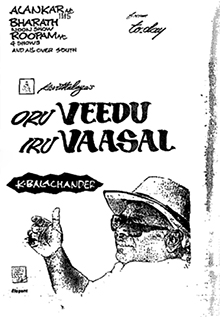Oru Veedu Iru Vaasal
| Oru Veedu Iru Vaasal | |
|---|---|
 Theatrical release poster | |
| Directed by | K. Balachander |
| Screenplay by | K. Balachander |
| Story by | Anuradha Ramanan (story 1) Ananthu (story 2) |
| Produced by | Rajam Balachander |
| Starring | Yamini Ganesh Kumaresh Livingston Surya Vaishnavi |
| Cinematography | R.Raghunatha Reddy |
| Edited by | Ganesh–Kumar |
| Music by | V. S. Narasimhan |
Production company | |
Release date |
|
| Country | India |
| Language | Tamil |
Oru Veedu Iru Vaasal (transl. One House, Two Entrances) is a 1990 Indian Tamil-language anthology drama film directed by K. Balachander, starring Yamini, Kumaresh and Ganesh. The film is a compilation of two stories; the first one was adapted from the novel Meendum Meendum by Anuradha Ramanan, and the second story was an original one written by Ananthu. Violin virtuoso-brothers Ganesh and Kumaresh made their acting debuts. The film had no songs. The film won the National Film Award for Best Film on Other Social Issues at the 38th National Film Awards.
Plot
This article needs an improved plot summary. (May 2022) |
The film contains two distinct story lines, each story lines revolves around Ganesh and Kumaresh. This film depicts difficulties women face(d) in a predominantly male dominated society. How these women when pushed to edge fight their ostracised husbands and set a tone and lead a meaningful life.
Cast
- Yamini as Vinoda
- Vaishnavi as Yamuna
- Surya as Shenbagam
- Kumaresh as Sukumar
- Ganesh as Jawahar
- Livingston as Arun Kapoor
- Charle as Elango
- Vivek as Panneer
- K. S. Jayalakshmi as Sivappu Rukmani
- Kavithalya Krishnan as Assistant director
- Sithara (Guest appearance)
- Nizhalgal Ravi (Guest appearance)
- Disco Shanti (Guest appearance)
- R. Sundaramoorthy (Guest appearance)
- Brinda (Uncredited Cameo appearance)
Production
One of the shooting locations was a bungalow called Kamakoti House in T. Nagar.[1]
Release and reception
Oru Veedu Iru Vaasal was released on 7 September 1990.[2] The Indian Express said, "When you read a novel, if the author has any creative power and capacity to create engrossing characters, and if you have the sensibility to appreciate this, you enter into a whole new world. Seeing Kavithalaya's Oru Veedu Iru Vaasal directed by K. Balachander opened up such vistas for this writer."[3] Ki. Rajendran of Kalki praised the film for eschewing box-office ingredients like action, comedy and songs.[4] The film became a box-office bomb.[5]
Accolades
| Event | Category | Awardee | Ref. |
|---|---|---|---|
| 38th National Film Awards | Best Film on Other Social Issues | Oru Veedu Iru Vaasal | [6] |
| Tamil Nadu State Film Awards | Best Editor | Ganesh–Kumar | [7] |
References
- ^ மௌஷ்மி (16 December 1990). "நடிக்கும் வீடுகள்..." Kalki (in Tamil). pp. 34–35. Archived from the original on 21 February 2023. Retrieved 5 January 2023 – via Internet Archive.
- ^ "Oru Veedu Iru Vaasal". The Indian Express. 7 September 1990. p. 3. Retrieved 22 March 2018 – via Google News Archive.
- ^ "Oru Veedu Iru Vaasal". The Indian Express. 7 September 1990. p. 7. Retrieved 22 March 2018 – via Google News Archive.
- ^ ராஜேந்திரன், கி. (23 September 1990). "ஒரு வீடு இரு வாசல்". Kalki (in Tamil). p. 1. Archived from the original on 1 August 2022. Retrieved 28 October 2021.
- ^ Shetty, Kavitha (28 February 1991). "With most films flopping, Tamil film industry faces a bleak future". India Today. Archived from the original on 14 September 2019. Retrieved 10 August 2018.
- ^ "38th National Film Festival" (PDF). Directorate of Film Festivals. Archived from the original (PDF) on 14 November 2018. Retrieved 14 February 2021.
- ^ "Chinnathambi bags six awards". The Indian Express. 30 October 1992. p. 3. Retrieved 14 February 2021 – via Google News Archive.
External links
- 1990 films
- 1990 drama films
- 1990s Indian films
- 1990s Tamil-language films
- Best Film on Other Social Issues National Film Award winners
- Films based on Tamil novels
- Films directed by K. Balachander
- Films scored by V. S. Narasimhan
- Films with screenplays by K. Balachander
- Indian anthology films
- Indian drama films
- Tamil-language Indian films
